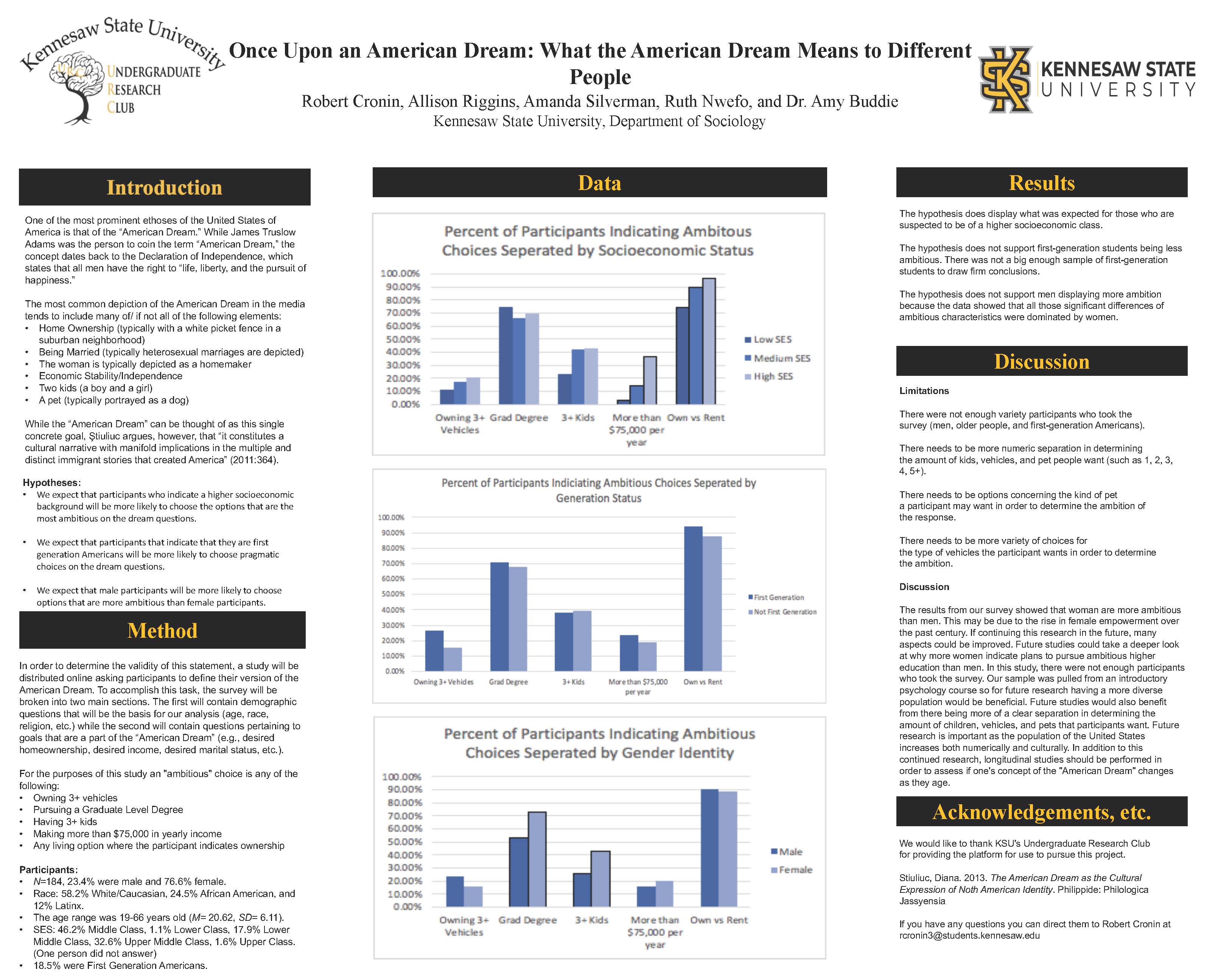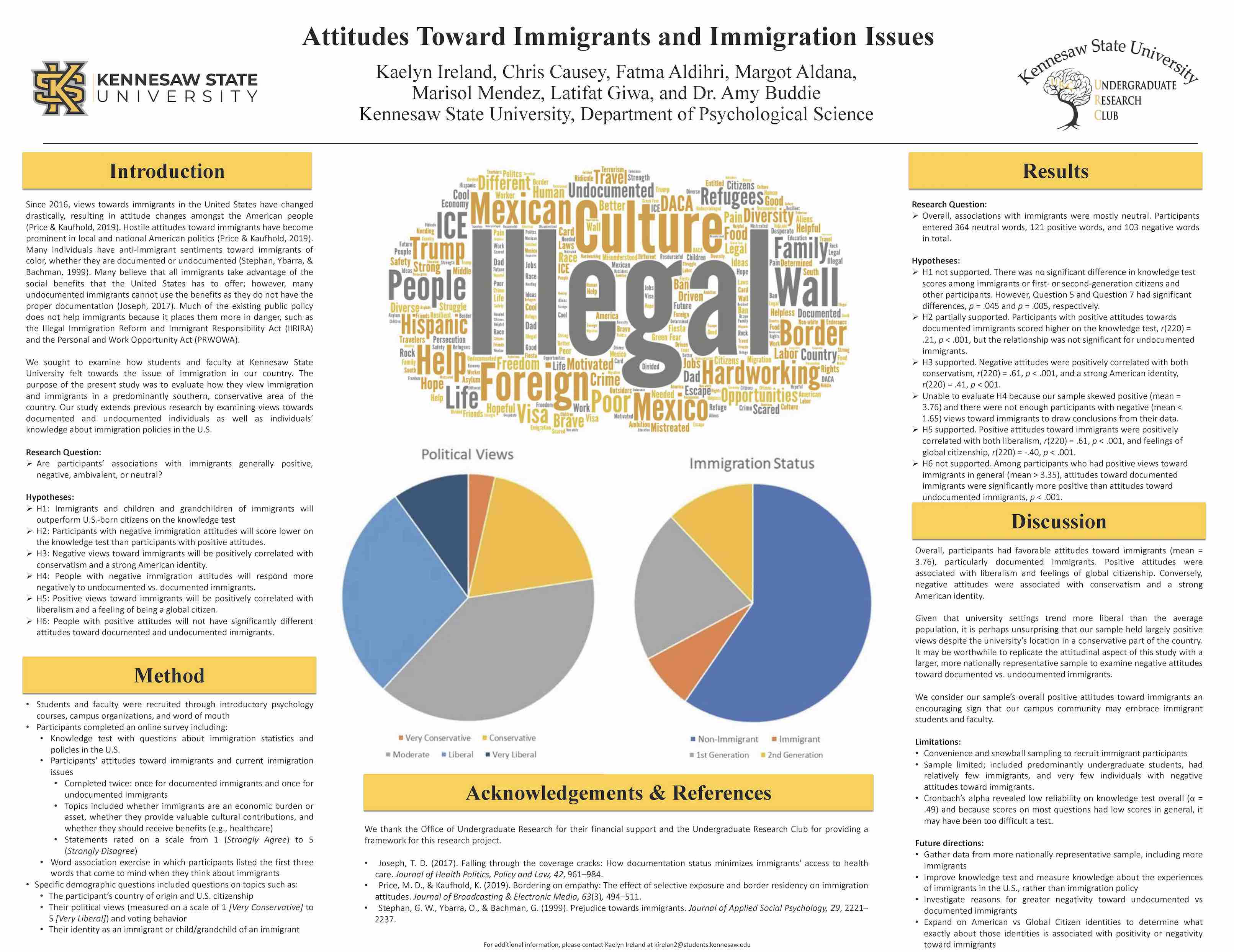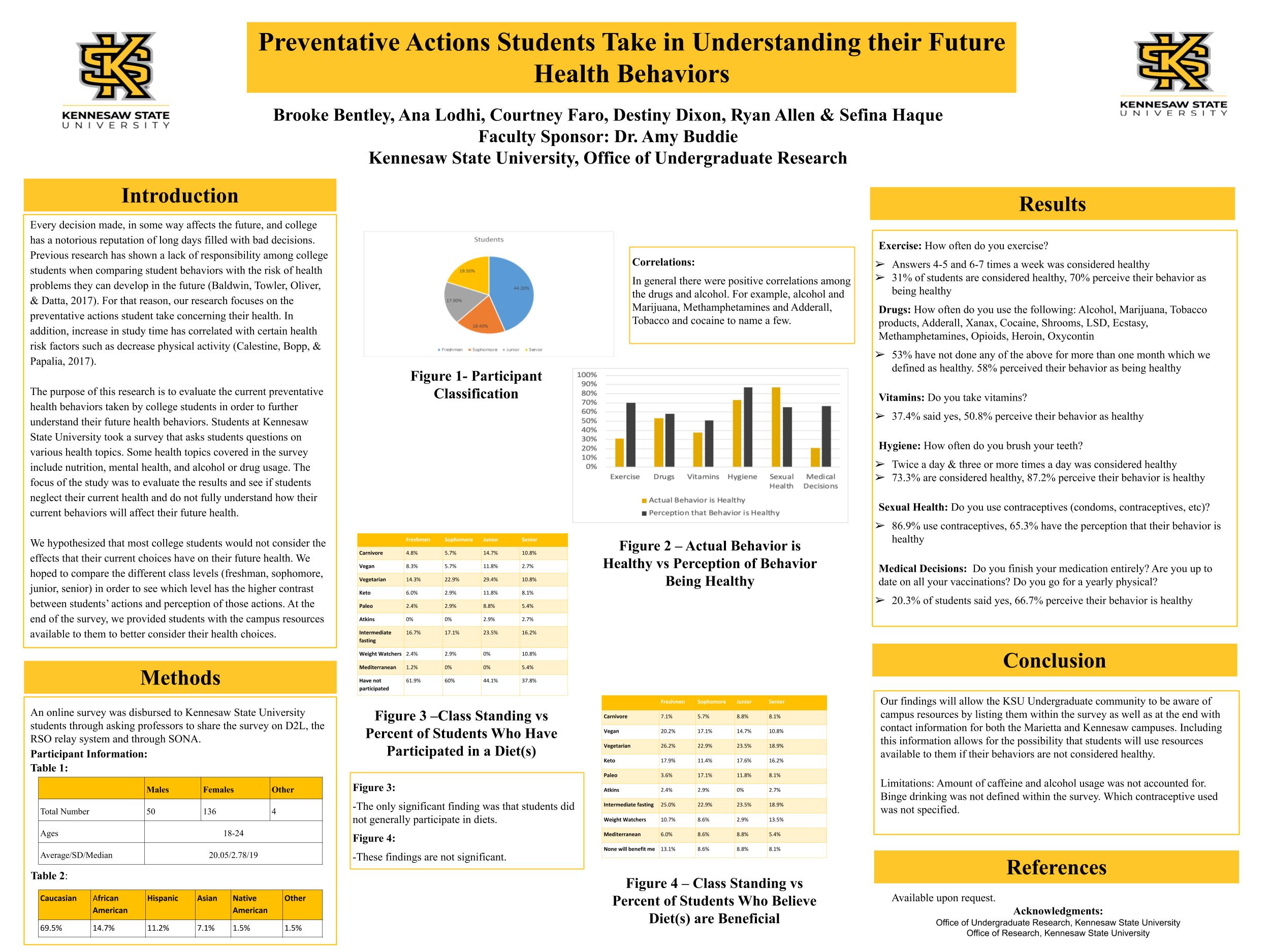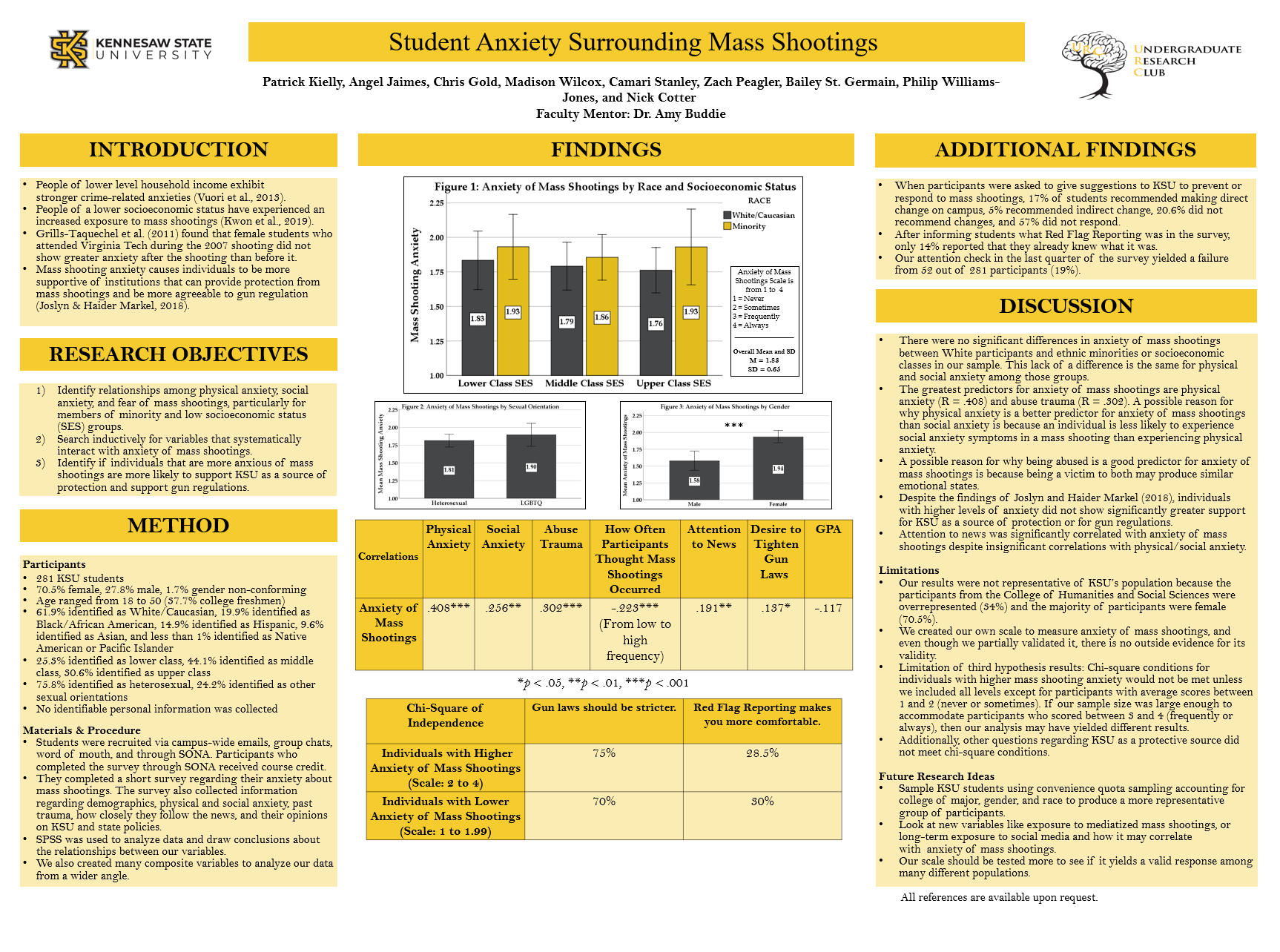2019-2020 Undergraduate Research Club Projects
 Once Upon an American Dream: What the American Dreams Means to Different People
Once Upon an American Dream: What the American Dreams Means to Different People
Principal Investigator: Robbie Cronin (President)
Co-Investigators: Amanda Silverman, Allison Riggins, and Ruth Nwefo
In this study, participants were asked to define their version of the "American Dream" (e.g., desired homeownership, desired income, desired marital status, etc.). We predicted that those from a higher socioeconomic background will be more ambitious with their ideal “American Dream” than those with poorer economic backgrounds. We also predicted that younger individuals will be more ambitious/optimistic with regard to their “American Dream” than older individuals. Finally, we expected that first-generation Americans will choose the more pragmatic options. The results of this study will add to the literature regarding the extent to which different groups of people endorse aspects of the American Dream.
Attitudes Toward Immigrants and Immigration Issues
Principal Investigator: Kaelyn Ireland (Vice President)
Co-Investigators: Chris Causey, Fatma Aldihri, Margot Aldana, Marisol Mendez, and Latifat Giwa
Do U.S.-born citizens and immigrants differ in their knowledge, attitudes, and positive or negative associations with immigrants and immigration? In recent years, immigration has become an increasingly important and hotly debated issue in the United States, with considerably variable attitudes among Americans toward immigrants themselves, as well as current issues and policies (e.g., deportation of undocumented immigrants). The purpose of this interdisciplinary study is to investigate factors that are associated with positive, negative, ambivalent, or neutral attitudes toward immigrants and immigration. We are also exploring differences among immigrants and non-immigrants in attitudes and knowledge about U.S. immigration policy.
 Preventative Actions Students Take in Understanding Their Future Health Behaviors
Preventative Actions Students Take in Understanding Their Future Health Behaviors
Principal Investigator: Brooke Bentley (Secretary)
Co-Investigators: Ana Lodhi, Courtney Faro, Ryan Allen, Sefina Haque, Destiny Dixon, Carolyn Dang, and Zeljka Zec
Previous research has shown a lack of responsibility among college students when comparing student behaviors with the risk of health problems they can develop in the future (Baldwin, Towler, Oliver, & Datta, 2017). The purpose of this research is to determine whether students actively make decisions toward the betterment of their health and whether they understand the future health ramifications of their current behaviors. In addition, the research presented will bring student insight towards campus resources available to them. Questions, via online survey, will be proposed to students at Kennesaw State University pertaining to health topics with the goal of providing college students with a list of resources to improve their overall health. At the end of the survey there will be a debriefing with resources pertaining to drug-related concerns, as well as psychological and health services. The questions in the survey will focus on various lifestyle topics such as alcohol consumption, drug usage/misuse, exercise, nutrition, mental health, doctor appointments, supplements, and hygiene. We anticipate that there will be a majority of students who neglect their current health and do not consider how their actions will affect their future. This information could help us educate the students at the university about the different resources available on campus to help them stay on track for a healthier future.
Attitudes Towards Recreational Drug Use: A Study of Kennesaw State University Students
Principal Investigator: Matthew Fenner (Treasurer)
Co-Investigators: Jack Arbuckle, Katerina Joseph, Aaron Murray, Coby Shepherd, Arely Cruz, Sierra Wynn, Priya Dogra, Giovanni Still, and Daron Pracharn
Illicit substance usage has always formed a substantial controversy in society, with differing substances being utilized for a variety of purposes and contexts. Prior research has indicated that substances have been used for stress relief, attention enchancement, and the attainment of peer approval (Agarwal, Loukas, & Perry, 2018; Lui, 2019; Maahs, Weidner, & Smith, 2016). The main focus of this study is on collegiate students’ attitudes towards these drugs and the correlation of said attitudes with substance use. Recent research has indicated that attitudes of college students towards drugs may be changing (Vidourek, King, Merianos, Burbage, Oluwoye, 2018). Additionally, drug usage is significantly higher amongst American college-aged individuals than the wider adult population (SAMHSA, 2017). Other research found that college students react more positively to substance abuse treatment programs than their non-student counterparts. (Sahker, Acion, & Arndt, 2015) Therefore, it is essential to the success of these programs that they are equipped with the most accurate data concerning student usage of these drugs. In order to measure college students' attitudes, the Drug Attitudes Scale, or DAS, was employed (Goodstadt, Cook, Magid, & Gruson, 1978). A modified version was used, in order to update some of the language for modern times, focus on the specific drugs of interest, and to distinguish between nicotine usage via smoking cigarettes and vaping. Additionally, two questions were modified from the Moral Disengagement in Doping scale, in order to have questions relating to each drug that could be directly compared (Kavussanu, Hatzigeorgiadis, Elbe, & Ring, 2016). In addition to providing updated data on students' attitudes towards these drugs, usage of the modified DAS – coupled with the modified questions from the Moral Disengagement in Doping scale – could provide an updated, modern scale which can be used to measure these attitudes in a variety of contexts.
 Student Anxiety About Mass Shootings
Student Anxiety About Mass Shootings
Principal Investigator: Patrick Kielly (Marketing Chair)
Co-Investigators: Bailey St. Germain, Camari Stanley, Madison Wilcox, Nickolas Cotter, Zach Peagler, Phillip Williams-Jones, Angel Jaimes, and Chris Gold
This research will examine the relationships among generalized anxiety, social anxiety, and fear of mass shootings, particularly for members of minority and low socioeconomic status (SES) groups. Previous research has examined the various types of mass public shootings and which ones receive more media attention. Previous research has also examined potential causes of mass shootings, ways to prevent them, and areas where mass shootings are common. There is little research on different types of anxiety (generalized and social) and how those correlate to fear of mass shootings, especially for minority groups in college. To examine this relationship, we will administer an online questionnaire with demographic questions, questions that examine generalized and social anxiety levels, and questions on fears of mass shootings on campus and off campus. We hypothesize that stronger correlations among generalized anxiety, social anxiety, and fear of mass shootings will emerge amongst participants who belong to minority groups rather than majority groups. Through this research we hope to find trends in anxiety levels amongst these student groups and use the findings to implement effective intervention programs at KSU. The purpose of this study is ultimately to ease anxiety levels among all students, especially those of minority status.











